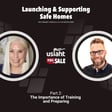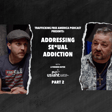Introduction and Alan's Story
00:00:00
Speaker
This is part three of our interview with Alan, a former sex buyer who has been rehabilitated. He helped begin an organization in the Tampa Bay area and now helps others with sexual addictions, as well as provide families and spouses of sex addicts in their difficult journey to recovery and restoration.
Educating Churches on Human Trafficking
00:00:18
Speaker
If you're just now joining us, I encourage you to go back and listen from start to finish to understand the context of this conversation.
00:00:25
Speaker
If you have been following along, we are jumping into this conversation talking about our advocate series. This is our free five part series that we produced with Francis Chan to help the church understand how human trafficking occurs in our country and how God has called his church to combat evil like this in his name.
00:00:44
Speaker
I highly encourage you to look into this series, which can be found on your dashboard as an abolitionist at usiaht.org or simply go to advocateseries dot.com. We'll play the audio of our trailer before the podcast officially begins. Again, our advocate series is free and can be accessed at advocateseries.com. Thank you for listening to the Trafficking Free America podcast.
Sex Trafficking and Church's Role
00:01:15
Speaker
We weren't really placed on this earth to judge God. At the end, we are actually judged by Him.
00:01:28
Speaker
A lot of it's going to be, why didn't you do anything?
00:01:38
Speaker
Almost three dozen missing children recovered in Southern California through a multi-agency investigation. Sex traffickers are people that take vulnerable women and literally wreck their lives by making them into sex slaves. You have to ask, who would do something like that?
00:01:52
Speaker
This is absolutely occurring and it's occurring right under our noses oftentimes. Right now, it is estimated that there are over 5,600 victims of child sex trafficking in Nevada. I would say that the the predatory acts are working more on children with very low self-esteem. These guys are master predators. They're picking off the children on the edges of the of the periphery, right?
00:02:16
Speaker
The study is to help us know how we can advocate for those who feel hopeless. It's to show how the kingdom of God can and will prevail against the gates of hell. If it makes you upset that children are being sowed 10 to 15 times in one night for months on end, it should. But what is righteous anger without a step forward to engage? I don't think anyone gets into this because they want to. I thought I deserved what I got. I didn't know I was peeing traffic.
Understanding Trauma in Trafficking
00:02:44
Speaker
The church should be on the forefront of this battle and be the ones going to war initially in their community, and being proactive in going after what's happened. And when I allowed people to love me, people in my life were showing me I was worthy and more.
00:03:00
Speaker
and that I could do it and that I could have a better life. We just want to be the handsome feet of Jesus to love them. How would Jesus react to human trafficking? How would Jesus react to children especially being abused and in ways that we can't even imagine? We can influence a culture into ending human trafficking in our nation and possibly around the world.
00:03:38
Speaker
One of the reasons why the U.S. Institute and Kinsoper sale launched the the advocate series, which is a series that is more so meant for church congregations to understand how human trafficking is happening in this country, but really to understand that human trafficking is just kind of the cause and effect of us um not paying attention to trauma in a neighbor's house. I mean, it's like every, so it's, ah you know, you can't say the word every, or 100%, but the data clearly shows.
00:04:14
Speaker
than most, if not all, of people involved in trafficking or in view people who find themselves selling or people who find themselves spying come from some kind of traumatic experience. Yeah, I kind of feel that all the vulnerabilities and ingredients that can cause a little girl to grow up and and be vulnerable to this and be victimized by human trafficking are the same ingredients that can cause a little boy to grow up to buy.
00:04:43
Speaker
In fact, I would go so far as to say that the only difference is the genitalia, the gender, that's it. These are broken kids and they grow up to try to solve a problem that's too big for them to solve their emotional pain in this way.
00:05:06
Speaker
So yeah, I mean, we need to do a better job with therapy and paying attention. um One of the things we learn in group is that the the behavior, you know, like the the pornography and masturbation or the sex buying isn't the problem. It's a symptom of a deeper problem.
When Attraction Becomes Addiction
00:05:27
Speaker
And we need to learn on how to solve and attack that deeper problem at its root. And that's what we do with our programs. Because people are afraid to raise their hand and say, I'm dealing with this. They're afraid to admit it to themselves.
00:05:40
Speaker
um and And that's what gives it its power. I don't know how much of your audience is spiritual, but we we talk about you know God and the enemy all the time, enemy being the devil, but this is the enemy's favorite weapon because of the shame and stigma associated with it. People will go down this rabbit hole until it takes everything from them before they'll even admit it because of the shame.
00:06:07
Speaker
So the best definition of an addiction you know that I've heard is any activity that you know is harmful to you, but you choose to engage in anyway. Sure. So it could be work, sure it could be cookies, it could be buying a certain type of music if you do it compulsively.
00:06:24
Speaker
um It could be a lot of healthy activities after they're clearly on the road. There's nothing wrong with being captivated by those pictures of naked people. It's a natural thing. It's a natural thing. Wanting to look, that's how God designed us, but he designed that so that we would bond with our spouses. That's supposed to be a one-on-one thing. So to clarify,
00:06:51
Speaker
When do you, when in your opinion is the moment you're like, I think you do have a sexual addiction versus just your normal attraction. Well, when you
Recovery and Relapse in Sexual Addiction
00:07:01
Speaker
choose to engage in that behavior and it displaces other priorities that were more important. Give me kind of a minor example. It could be anything. It could be ah you're trying to do that like on your lunch break and you lose track of time and you're five minutes late to a meeting and your boss's boss was on that meeting and you didn't know and it ends up being one of these embarrassing things at work.
00:07:23
Speaker
And if too many of those happen too close together, now you're under the microscope, right? You could lose your job. So there's consequences. um in Our recovery programs, um you know, lapses happen. Guys just don't walk in the door and quit cold turkey, okay? It's a process. Well, like let's back up a second for what you just said. That becomes a really bad problem in that situation, but let's let's talk realistically here. ah You're not saying that, hey, just like it's okay to have a drink once in a while, you can have porn once in a while.
00:08:02
Speaker
No, I'm not saying that. right so What I'm saying is the desire to look is doesn't make you an addict. I think that's built into all of us. OK, that's fair. Yeah, when you make a choice to consume, OK, now you have a problem. Got it. um When you make the choice to say, I'm going to actively see seek this out. I see beautiful women all over town. yeah Yeah, I go to the gym. I work out. If it comes in front of you, that's different. You choosing to go find is different. In a way, it's not. Because, yeah, yeah like you're saying, yeah If I'm at the grocery store and I turn the corner and there's an attractive young woman there, yeah, I noticed that. We're not gonna pretend that she's not beautiful. yeah She's beautiful. yeah And it's okay to recognize that yeah and appreciate her and yeah who made her. yeah were not That's all good. and attract yeah yeah Once. yeah Once. right If you start pretending you need an item on the aisle she's at so that you can go buy her again,
00:08:57
Speaker
If you're turning your head and checking her out, ah that's a problem. yeah Now you're objectifying her. She's no longer a person. yeah She's no longer a daughter of God. She's now a piece of meat hanging in a locker. you know Because you're not trying to pursue her. You're just trying to enjoy her. Right. And then like if you go home later and you fantasize about that person that you don't know, okay that's a problem.
00:09:22
Speaker
We should not be doing that. And that's the kind of normalizing you're talking about. Because if you kind of have that mindset right now, you need a safe place to go, hey, I'm doing, I know this is not right. I need to do this movie before it gets any worse. I think the thing about sex addicts is we wait until the extreme happens. We wait until the extreme happens before we do anything. I've got guys, a guy in my group came through 70 years old.
00:09:49
Speaker
Been through three marriages hurt all kinds of people for decades and he got well And I don't know how much time he has left neither does he maybe a decade But he's walking in freedom and the happiest he's ever been that's the other thing I want to say about this process Yes, we come in because of the sex addiction and yes, we can fix that But the way we fix it at its root makes the people who go through this process better at everything They just become better people They're better spouses. They're better parents. They're better friends. They're better employees. Because what are they realizing? They're resolving their unresolved pain. ah This, I think, will resonate with most people listening, but, you know, we all have like this, oftentimes, not everybody, but a lot of us have this negative tape that plays in the back of our mind from when we were cut down or criticized as kids. Maybe you had a parent who wouldn't affirm you. Maybe you were over criticized.
00:10:45
Speaker
and it's the I'm not good enough tape. The I don't measure up tape. The I'm unworthy tape. The I'm inadequate. The I will screw up tape. There's no hope for me tape. Why should I keep trying tape? A lot of us have that. In our groups, we unpack all of that. It takes six months to a year, but we write out our whole sexual histories, and we write out all of our worst moments in life, and we connect all that and distill it into what are our worst moments. Some guys have 10, some have 16, some have 8. It doesn't really matter, but we write them all down. And then from that, we distill it further into what are our core lies. What is that tape in the back of your mind telling you every day?
00:11:34
Speaker
Once that's established, we counter it with core truths. What's the truth about you? you know um Positive messaging. ah For the guys that have a faith tradition, this can be highly biblically informed. um doesn't have to be It just has to be positive.
00:11:52
Speaker
And then we jump into the neuro-linguistic reprogramming. They write these core truths on a piece of paper or on the mirror in their bathroom. And when they go in to brush their teeth in the morning at night, they look at themselves in their own soul, through their own eyes, and they say the core truths out loud, twice a day, every day, for at least 90 days, sometimes six months. And when they can reprogram that negative messaging into something holy and positive,
00:12:22
Speaker
changes their whole life.
Rehabilitation and Empathy
00:12:24
Speaker
How often are you accused of being called sympathetic to the buyer? I haven't been, not by one person. Yeah. But I'm sure a lot of people think it. Okay. And you know, the reason I'm sympathetic is because I lived it. Sure. And I've been able to connect the dots on all these circumstances that were not my fault, that were not my choice, that pushed me in this direction. And, you know, I just thank God that I found the right kind of resources so that I could help myself and get well.
00:12:55
Speaker
And it's been such a revelation to me because if I can do it, others can do it. And I just feel compelled to duplicate my healing experience in the lives of these other men. um Not just because I love them, it's because I love everybody. And you know I feel terrible about my past behavior. And I see this as a way, if it's possible to atone for it,
00:13:23
Speaker
This is a way I can kind of make good on it. If I can emancipate women by healing men, that's a good thing. You talk a lot about data. Can I share some data? yeah okay share some data We have 11 men ah who are expires recovered that we have data on. there's There's more than that, but I have data on 11, and my data is in this 11.
00:13:47
Speaker
These 11 men who have reached a point of lifelong healing have collectively displaced 16,350-ish sex purchases from the future.
00:14:01
Speaker
That's not 16,000 different women either. No, du it's just, it's a sex purchase. It's an interaction. A lot of times it's the same two people over and over again. Sometimes it's, you know, new people, but it's keeping someone in that life, keeping someone in bondage. Okay. So that activity is gone. It's wiped off the face of the earth. Here's what it means. There's about $2.3 million dollars that didn't go into the sex market.
00:14:27
Speaker
We think about 1.6 million of that money now is no no longer going to flow into the drug market and contribute to all kinds of crime. So that's gone. The same men have also stopped watching pornography because they're not sex addicts anymore. So that's over 111,000 hours of pornography gone.
00:14:47
Speaker
which is a continuous stream, something like 16 years long, it would take someone watching porn as their full-time job, 56 years, to consume all the pornography that these guys aren't consuming. So that's good. um But the most important thing is it brings approximately 4.8 years of freedom to one trafficked individual.
00:15:12
Speaker
And according to the research we have, we think that's about the same as putting a trafficker out of business for a year. It's not the same as like rescuing a woman for five years or putting a trafficker out of business for a year and then he goes back into business. Okay, the activity went away. So the market is gone to that extent.
00:15:36
Speaker
with 11 men. So I hope people can understand why I want to minister to more men. What could I do with 110 men or 1,100? It works. It's scalable. It's sustainable. And the problem's solvable. I just have to get the word out and grow it.
00:16:01
Speaker
This is the reason you're watching this training. Just think about that data. If we had groups, systems, and recovery of sex addicts, how many victims of trafficking could we save? How many traffickers could we put out of business? This is how you fight the demand. You'll always have bad apples. You'll always have those who just do not care. As Alan stated before, someone has to want to change.
00:16:30
Speaker
Let's not hinder those who are willing to change and not be able to do so because of those who refuse.
Church Programs and Engagement Challenges
00:16:38
Speaker
Again, we do not condone, empathize, or believe that there should not be consequences for purchasing sex. However, we are condoning rehabilitation. We are condoning a way to set them free from their addicted bondage. We at the U.S. Institute believe in the redemption of Christ.
00:17:03
Speaker
Sounds like what you're saying to me is like every single church in America should have a buyer program. Oh yeah. Should have a sex addict program. Let's put it that way. Yeah. Doc Roberts knows more about this than anybody. Like I said, I've been working on it 35 years and he says, and I don't believe he's wrong, half the Johns in America are Christian men. But if you walk into corporate church world and start talking about this issue, they do not want to hear it. They don't.
00:17:33
Speaker
um you will find some more enlightened churches that know because their youth ministers and their cool ministers are approached by the younger guys. Not the older men, but the younger guys will say, hey, I need help quitting porn. They know it's a problem. yeah So if you come with a recovery group to help guys do that, they're interested. Where are the churches getting it wrong? and that i think many I do think many churches are trying to address porn addiction and stuff like that, but how I think they're having trouble getting them to show up.
00:18:03
Speaker
Because imagine, it is I think about me right now. If I were to always, like my church is actually having a one of these groups like, Hey, if you're having an issue with porn, like, like men get together, blah, blah, blah. I can't imagine what I, what my wife would say if I just said, Hey, I need to go to that, to that meeting. Let's be fair here. My wife would freak out. Yeah. She would. And it's very tough to navigate because um what you're talking about is a disclosure and that is a bag of snakes.
00:18:38
Speaker
Disclosures are better than discoveries. but they need to happen. And there's a right way, and there's a wrong way. Can you help us with some, what what you- Well, there's a lot of different philosophies of thought. Yeah, your experience, yeah, by all means. Okay, now, a Pure Desire will tell people, not just them, but they collaborated with KingdomWorks Studios about 15 years ago on a product called Conquer Series. A lot of us have heard of it. And it's a great series that deals with this pornography addiction subject with men.
00:19:13
Speaker
So, they tell the men in that product, this is 15 years ago, and it may not be the best wisdom we have available now, but they tell them, don't tell your wife. And I've spoken to some people in certain churches, I won't say which church, who also believe, don't tell your wife.
Disclosure in Marriages and Family Support
00:19:35
Speaker
now They have their different reasons. you know like This church guy I'm thinking of, his reason was she's better off not knowing, you know because the betrayal trauma is so bad and it will cause a divorce. um The behavior that causes the divorce has already happened. We just need to tell the truth and deal with it. So that you challenge the men. Yeah, i don't I don't buy into that. Now, at Pure Desire, the reason was they were trying to help the marriage um by helping the man, they said, you need to establish six months of sobriety before you tell her. um Their reason for that was twofold. ah One was for the man. They wanted him to have his band of brothers, right, in the group. He wanted to have those healthy male relationships established because if the marriage failed, he was going to be in crisis and he was going to need that help.
00:20:32
Speaker
um The other reason is more admirable. They recognize the betrayal trauma that's visited on a spouse when she goes through a discovery or a disclosure to be so highly traumatic. I mean they've measured it and it registers the same as PTSD that you'd see from a soldier coming home from a hot spot.
00:20:56
Speaker
It's really, really, really bad. And if her husband has not attained sobriety, then we get into what is ah called a staggered disclosure, where he tells her some of the truth or all of the truth, but then he has elapsed the next month and has to re-disclose, I did this, I did that. And that type of staggered disclosure is even more traumatic. They put it on the level of a person who's gang raped over and over again.
00:21:25
Speaker
So it'd be like the same as taking a woman like that into a trafficking situation. um It's just absolutely horrible.
00:21:39
Speaker
I respect Dave a lot, the president of my board, and his thinking on it I think is correct, which is um don't lie to these women.
00:21:55
Speaker
You need to tell them the truth and you need to tell them right away. A disclosure like that obviously needs to be brokered by a professional, if at all possible.
00:22:10
Speaker
um And then we really just have to pray about it because it can go sideways easily. But again, the events and the truth that has occurred that brings about that consequence has already occurred. We're just being honest about it now and a perfect world.
00:22:26
Speaker
The man would be sober already and you could have one disclosure. The man would have a support system. We would have a support system for the woman. And that's part of what I'm trying to do at the Sexual Integrity Project. I really hope and believe that this group that starts for um betrayed women tomorrow will in a year or two time produce several women who have gone through the program who have this as part of their life experience and who had the grace to stay in their marriage and heal it. They can minister to other families that need it.
00:23:04
Speaker
We don't have that right now. And a lot of the men who come to us do everything right. They get sober. They overcome their sex addiction, but they still lose their marriage. Peer Desire has an interesting analogy for how we treat this. They they say, imagine a station wagon right or an SUV driving down a country road late at night. you know Dad's behind the wheel. He loses control of the car. Maybe he falls asleep, hits an oak tree, you know at like 50 miles an hour.
00:23:35
Speaker
So everybody in this car is messed up and mangled up bad. But they're not dead and the ambulance comes. And they would say, well, this accident is clearly the driver's fault. Let's get him in the back of this ambulance, take him off to the trauma four, level four trauma center, right? And give him a surgery and rehabilitation and physical therapy so he can get back on his feet. And they leave the wife and the kids in that car broken up and bleeding to anguish with no resources because it wasn't their fault, right? They didn't cause that accident.
00:24:15
Speaker
That's what we do when families are hit with this bomb. We have resources for the men, and we don't do anything for the spouses or the children. And that is, in my view, and Dave has actually said it, that's that's criminal. We have to minister to the whole family. And I believe if we do and we do it right, we'll have better outcomes for these families.
00:24:40
Speaker
The truth is, and I'm sure there's a lot of women feeling betrayed that are that hear this or ultimately hear this and they're gonna hate me when they hear me say this, but your husband's behavior actually has nothing to do with you. It's not your fault. why Why wasn't I enough? How come I'm not pretty enough for you? Why don't you find me sexy enough? I was available. Why would you step out? They make it about them. But this is about the husband's unresolved trauma and his issues.
00:25:09
Speaker
has nothing to do with his wife. That's the truth. And the sooner we understand that, the the better we can minister to both sides, right? We're inextricably linked in the health of one redounds to the health of the other. We have to help both. I would take this up further, I guess to say, um it's also not your job to fix them.
00:25:34
Speaker
Are you talking about the husband fixing the wife or the wife fixing the husband? The wife fixing the husband. Oh yeah, that's one of the things they learn in their portrayal classes, if it's a good one. We cannot help someone's sexual addiction and believe that that will heal the family as well. Damage has been done. If we are to encourage more people to come forward, primarily men to come forward, we must care for the spouse and the children as well.
00:26:01
Speaker
They cannot be thought of as healed if the sex addict is healed. We have shown and stated multiple times that sexual addiction causes immense trauma to relationships. I want to encourage you, if you're a group or church that is helping with sexual addiction or porn addiction, it does not end there.
00:26:22
Speaker
Professional help must be involved to help the family. And we should not think of this as a minor need, nor should we wave it because it's too expensive or too hard to provide. It's important for the community and the church to surround a family that might be going through this by showing the love of Christ, but using professional help. Additionally, do not make this addiction a secret. Do not lie to the family.
00:26:50
Speaker
Use discretion for the children, but do not lie to the spouse. Do not hold information from the spouse. There must be an understanding that while healing is the priority, we cannot promise that there will not be consequences. At the U.S. Institute and Kids Not For Sale, we want to see healing on all ends. We do not want to see relationships severed.
00:27:14
Speaker
but we must understand the reality of the situation and not cause more trauma. As we've seen from the data, trauma often births the cause of an unhealthy addiction, and the cycle would just keep repeating over and over in that family.
Alan’s Journey of Reconciliation
00:27:29
Speaker
In this next session, Alan will share some thoughts for how he's witnessed help that has worked out well, including in his own life.
00:27:37
Speaker
This does not represent all situations, but we wanted to share Alan's experience in this conversation and how he has witnessed different techniques through his rehabilitation center.
00:27:50
Speaker
What do you want the the wife to do in that situation? Every family's different. yeah Yeah. Every family's different. Every woman's different. My wife has grace like you would not believe that she took me back. Um,
00:28:07
Speaker
And I'm not saying that women should have more grace. I mean, hopefully they would develop it and be able to extend it. But every family's different, every marriage is different. What I think could be a good solution is if when this happens, when there's a disclosure or a discovery, that this type of sin is crept into a marriage.
00:28:29
Speaker
that the church step in or if they're not a church-going family, a marriage therapist would have this as a suggestion. yeah Let's do a long-term brokered separation. sure You don't have to physically separate unless she just can't have him on the property. Okay, then I'm an advocate of the man moving out, not the woman, because the family's much more likely to remain intact if it's the man who moves out than if the woman moves out.
00:28:58
Speaker
um That could be under the same roof, you know, husband goes to a spare room. And you could say, let's just take a break. Just take a break for six months or longer, whatever's appropriate for that scenario. And we're gonna get the offending spouse the help he needs to overcome his behavior. And we're gonna give the betrayed spouse the help she needs.
00:29:22
Speaker
to overcome that deep wound and recognize the gender roles that I'm using, they can be the opposite. yeah And when when you consume pornography, you make it about 300% more likely that you'll step out on your marriage and it doesn't matter your gender. Pornography will do that to you. So yeah, if we can get them to help and then come back in six months or whatever period of time, let's just reassess it then because it's easier to make a decision if you know the behavior stopped.
00:29:51
Speaker
and it's easier to make a decision if you've healed from a betrayal wound, you know, a good decision. Because this is traumatic and you should never make any big decision when you're traumatized. That's a bad idea. What would you say to someone who's possibly in the extreme case of I'm buying or heavily watching porn?
00:30:13
Speaker
to the son to the person that, yeah, I'm having a lot of struggles, you know, back to your illustration about the, assuming a woman at the grocery store, and you keep trying to take a look, I think I might be of objectifying women myself, and I know that's bad, and I'm not taking these extreme steps. What would you say to both in that situation? Well, you're talking about two people with unwanted sexual behavior, and that's exactly the population we minister to.
00:30:41
Speaker
So I would say, you know, once you come to group, check it out. If they come, they're going to hear testimony from men that have been in a worse circumstance than them and either overcome it or made great strides towards overcoming it.
00:31:01
Speaker
that can do a lot to inspire somebody to start the process. Because many of them believe, like I believed, what I'm dealing with cannot be fixed. I believe that with every fiber of my soul in 2018.
00:31:18
Speaker
My wife divorced me. I got kicked out of the house. She never wanted to see me again. She wanted to take my kid away. She wanted child support and alimony. means She went,
00:31:30
Speaker
full bore on all that stuff. After about six weeks she was having second thoughts and she approached me with this structured long-term separation option, which is actually a brilliant and very grace-filled idea. And I credit her with that idea, that's my wife's idea. um I looked at her and I told her no.
00:31:57
Speaker
Because at that time, I was a monster. I was engaged in high-risk behaviors with high-risk people, and I could not stop. And I was unaware of the resources that could help me stop. I didn't think they existed.
00:32:11
Speaker
So in my mind, what I was dealing with could not be fixed. I believed that I was gonna die alone, probably of AIDS. You just wanted to accept your fate. Yeah, I had resigned myself to death and decided that the only way I could protect my loved ones, my wife and daughter, who I do love very much.
00:32:31
Speaker
was to stay away and I told her no. I found out later in therapy that that no hurt her more than all the infidelity put together. And Dave helped her understand my rationale. We went ahead with the divorce and it gave me the time and the freedom to find these types of resources. I walked the walk, I did the work, I went through the process, I worked very hard. I even did two groups a week for 18 months.
00:32:56
Speaker
And by the end of 2019, I was a changed man, and my wife saw that change. She asked me again if we could get back together. And I would not but was afraid to make that decision. I wouldn't go there unless I knew 100% that it was the right thing for my daughter, the right thing for my ex-wife, and the right thing for me.
00:33:20
Speaker
And I prayed about it, and I just chewed on that nugget for days and days and days. And in the end, the answer was yes, yes, yes. And I told her yes. And the Lord redeemed everything I had lost all at once, nearly two years to the day that I told her no, we were remarried. So... If there's anything that we believe, the restoration exists. Yeah, showing those examples, sharing those stories with a guy who is hopeless and stuck.
Prevention and Community Involvement
00:33:51
Speaker
That's how you can motivate them to start the process. And then if they'll just watch Conqueror series or Sexual Integrity 101 that walk through this whole addiction thing, what it does, what porn does to your brain, how to fix it, the community element, you know, it takes about 10 hours of study just to download the information.
00:34:11
Speaker
But that can educate and inspire somebody to do the real hard work. Then we go into larger workbooks that are eight, ten months long like Life Recovery Guide for Men or Seven Pillars of Freedom. And in these books, you really unpack your stuff. There are hard, provocative questions that require some serious answers that hurt. It hurts to answer.
00:34:37
Speaker
and Journal out the answer because you have to go to places that you haven't gone you've just suppressed But we got to dredge all that stuff up and deal with all of it and at the end of that road You have a healthy person Who's no longer compelled to medicate and the ways that they did before? um And like I said, it makes them a better person all the way around and And you asked earlier, what is America getting wrong? What is society getting wrong? What is our churches getting wrong and our families? And it's that. We live in a fallen world. We're not perfect. erest henry Ernest Hemingway said once, the world breaks everyone. But afterward, some are strong in the broken places. We have to go to the broken places, fix it, and get strong. That's what we need to do.
00:35:28
Speaker
Last question, you said you, when your wife we asked you for the separation, you said no, because you kind of given yourself up to death and that kind of thing, but you still went to group, huh? What made you still stop try to stop buying even after losing everything? Well, it was my motivation. um I mean, I recognized that when I told my wife the truth about my behavior, that I would lose everything. I knew the chips were going to explode and fall in every little place, but I also knew that God would help me pick them up.
00:35:58
Speaker
Now, I didn't know if I would ever get my family back, but what I did know is that I would grow into the man that God was sculpting me to become. I submitted, I started to repent instead of rebelling, and I started to listen to what God wanted from me. And when God tells you to do something, you answer. That's what you're seeing with me. That's why I didn't go back to it. That's why I didn't quit my recovery when my wife took me back.
00:36:27
Speaker
I keep pushing. you know I'm humble. I recognize I'm not out of the woods yet. I still have work to do. you know I'm not 100%, but it doesn't mean I can't be a wounded healer. It doesn't mean I can't walk this walk and show another guy the steps. right i'm I'm not a genius. I can't heal a guy, but I can show him what to do. I can reintroduce him to God and just step back and watch that relationship work.
00:36:59
Speaker
We push toward prevention, victim care, and victim restoration. We need prevention, victim care, restoration, definitely for those who are being vulnerably taken advantage of to then become cellars of their body, who are objectified in that way. But let' talk in this episode, we're talking about the other side of it, there the the demand.
00:37:27
Speaker
And on the prevention side, we need to raise boys who have an an understanding that sex addiction is a thing that can happen, and we need to figure out a way to not fall into that trap. We also need care, such as churches, having this ability for men to be able to have a safe place to go, to have the ability to find that care for their sex addiction, whether it's in the extreme side or the early stages. And then we need restoration.
00:37:57
Speaker
That is the ability of accountability in the right way. The restoration to figure out how we can save marriages. And imagine a world where the the where the buyers they cannot feel buyers, they cannot get buyers anymore because they cannot cause sex addictions. And if sex addiction does not happen, then it's harder to buy women and but on the streets, online, whichever. Traffickers are are not able to grow this industry and marriages are thriving. yeah We have a saying in group when we talk about these wounds that come from family of origin. Some of that brokenness, it's generational, right? It's passed down from the great grandparents to the grandparents to the parents, and then it's visited onto this man that's sitting in the group with you. And we tell him, ah you know, it ran in my family until it ran into me.
00:38:51
Speaker
That chain of events can be stopped if someone goes through this recovery process. They can be the one that provides a healthy family of origin for their children. And that's how you turn the tide. It's a slow process. I mean, what what really needs to happen here is healthier families of origin, healthier experiences for children, protection for children so they're not exposed to pornography,
00:39:17
Speaker
or the predation that's out there um by pedophiles and others who want to traffic them.
00:39:26
Speaker
That's what has to happen, and that's a Herculean task that would take decades to accomplish. We have to start, and then we know a little bit about how to pick up the pieces. You know, women are being rescued every day. I would like to say buyers are being rehabilitated every day. I hope that becomes a true statement. We know how to do the reactive and redemptive work of restoring a life.
00:39:52
Speaker
that needs to continue. And if we just do a full court press, we could have a different society 50 years from now, but it's going to take a lot of hard work, hearts and minds of of people like us who see the problem for what it is and want to fight to solve it. If you could tell yourself something 20 years ago, what would you say to that person?
00:40:23
Speaker
I would have to say to that person. um Everything you're telling yourself in the back of your mind is a lie. It's a lie. Don't believe it. You are a treasured and valued son of God. You were bought at a price.
00:40:50
Speaker
And the Lord loved you before He ever knew you. He loved you when He knitted you in His mother's womb. And He'll never stop. And there's not a single thing that you or anyone else could ever do to change it. Because I believe that now, and I've been through a lot.
00:41:11
Speaker
It took 50 plus years for me to believe that. If I had the chance to tell the me from 22 years ago, anything, it would be to put that in my heart 22 years ago. No matter what help you need to get. Yeah. Yeah. And I would also say there's a solution because I didn't learn that until about five years ago, but yeah.
00:41:36
Speaker
Alan, thank you. I want to thank you for sharing your story with us. It's not a hard thing to do. it's not sorry It's not an easy thing to do. No. And I appreciate you taking the time because I want people to hear this who might be you 22 years ago. Yeah, there's a lot of guys out there and I appreciate the opportunity. And you're right to suggest that it's difficult for me to tell my story. It is. It's embarrassing to admit to my behavior.
00:42:05
Speaker
But it's not about me, right? If my story can help just one person with a course correction and change their life so that they can avoid the decades of disaster and destruction and pain that they ultimately will cause and live through if they're not able to overcome it, then that's a win. Just one guy.
00:42:41
Speaker
Prevention, care and restoration. That's what our call to action has been to our abolitionists who are engaged in this fight. Whether they are someone who began selling themselves, someone forced into sex trafficking, or someone who began buying, we must fight trafficking with the mindset of prevention, care, and restoration. Ponder this conversation with Alan. Share it with someone else so that they may become an abolitionist with the U.S. Institute.
00:43:09
Speaker
Bring this discussion up in your church, group or community or city about sexual addiction. As we fight to protect our men, women and children from being trafficked, how can we protect our men, women and children from being exposed, groomed and given opportunities to become a buyer?
00:43:25
Speaker
How can we properly address the reality of sexual addiction in this country through prevention, care and restoration? Thank you for watching and thank you for being an abolitionist and continuing to educate yourself on how to fight human trafficking in the United States.








